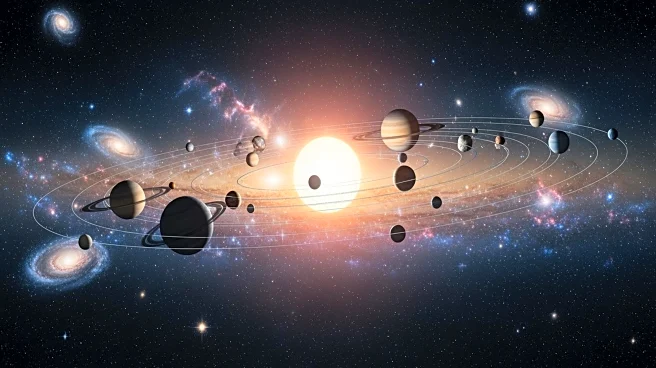What's Happening?
The Europlanet 2024 Research Infrastructure project, funded by the European Commission, has been evaluated for its impact on planetary science. The project, which ran from 2020 to 2024, provided access
to planetary simulation facilities and data services, and supported community networking and training. The evaluation, featured in Nature Astronomy, emphasized the project's success in fostering collaborations and advancing research. Key findings highlighted the importance of networking and personal contacts in achieving high-impact science, with over 90% of Transnational Access visits resulting in ongoing collaborations.
Why It's Important?
The evaluation underscores the critical role of collaboration and networking in scientific advancement. By facilitating access to resources and fostering international partnerships, the Europlanet project has enhanced research capabilities and opened new avenues for exploration. This approach not only accelerates scientific discovery but also supports early-career researchers, providing them with opportunities that might otherwise be inaccessible. The project's success demonstrates the value of coordinated efforts in addressing complex scientific challenges and highlights the importance of sustained investment in research infrastructure.
What's Next?
The evaluation will guide future priorities for Europlanet, now a self-sustaining non-profit association. By identifying areas of greatest impact, the organization can allocate resources effectively to continue supporting the planetary science community. The findings will also inform policy discussions on research funding and collaboration strategies, emphasizing the need for continued support of international scientific networks. As Europlanet evolves, it aims to maintain its role as a catalyst for innovation and collaboration in planetary science.
Beyond the Headlines
The evaluation challenges the stereotype of scientists as isolated geniuses, highlighting the collaborative nature of modern research. It also addresses the challenges faced during the project, such as the pandemic and geopolitical events, which required adaptive strategies. The emphasis on community and collaboration reflects broader trends in science, where interdisciplinary and cross-border partnerships are increasingly vital for tackling global challenges.











